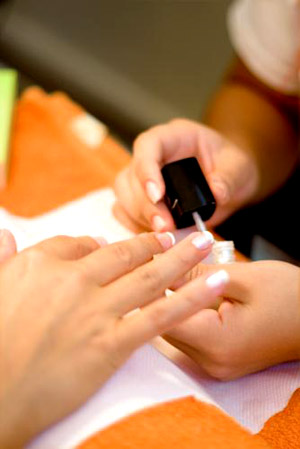Nail Care
About Nail Care
The nail is made of a hard protein called keratin. A protein is one of the building blocks which make up the body. The nails help protect the ends of the fingers and toes from trauma and also help us pick up small objects. Over the last hundred years, the nails have become more important for cosmetic reasons and less important for protection. Manicuring is the care of the hands and nails. Basic manicuring should be done once a week. Every 4-6 weeks it is a good idea to seek the services of a professional manicurist. A professional manicurist best knows how to keep your nails looking healthy and beautiful.
Weekly Nail Care (15-20 minutes each week):
- One of the most important parts of maintaining strong, healthy nails for life is making sure you have the vitamins, minerals and other important nutrients to maintain nail strength.
- Remove any old nail polish. To remove the old polish, first moisten cotton with nail polish remover and press over the nail for a few seconds to soften the polish. Then with a firm movement, bring the cotton from the base of the nail to the tip. Repeat this process until all of the polish is gone.
- Shape the nail, using a file or emery board. File each nail tip from corner to center; do not file in a see-saw motion with the emery board because doing so can cause ridges in the nail and nail splitting.
- Soak the hands in warm, soapy water for a few minutes to remove dirt. Clean under free edge of nail with orangewood stick.
- The cuticle is the skin that grows from the finger onto the base of the nail (nail root). We recommend that the cuticle not be pushed back. Leaving the cuticle intact helps to prevent infection of the nail growing tissue.
- Now apply clear nail polish. There is no reason to waste money on several different kinds of clear polishes such as a ridgefiller, base coat, top coat or nail strengthener. They all do about the same job. After the clear polish dries, apply a color polish of your choice if you wish. Let dry. You may then reapply the clear polish as a top coat. This will help strengthen the nail and prevent chipping of the nail polish.
- Finally, apply a moisturizing cream or lotion to the hands and cuticles. This will help prevent splitting of the nails.
Nail Care Tips:
- A good time to do your manicure is after you have taken a shower, bath or after washing the dishes. This is because these activities remove the dirt from under the nail.
- Nail polish thinner can be used to thin out nail polish that has become too thick. Keep the polish in the refrigerator to make it last longer.
- Try not to use nail polish remover more than once a week. Nail polish remover causes the nails to dry out. Dry nails crack and split more easily than nails that are well hydrated (well-moisturized).
- A top coat or sealer is a liquid that is applied over the nail polish. Any clear nail polish can be used as a top coat or sealer. This will minimize chipping or cracking of the nail. On natural nails, a clear coat can be used every day for seven days to give the nail protection and keep the moisture in.
- After washing your hands, apply a cream or lotion. Hands and nails tend to get dried out from soaps and cleansers. You should try to keep your hands and cuticles well lubricated, with a moisturizer such as Aquaphor, Moisturel, Vaseline. You should use an oil or moisturizer at bedtime every night.
- Sometimes nail polish, dirt and bacteria can stain the nails. This can be removed by using a Q-tip or an orangewood stick with a cotton tip. Soak the cotton in 10 parts water mixed with 1 part bleach, then rub the nail where the stain is. This will remove most stains from the nails. Scrub under the nails with a nail brush or toothbrush with soap or bleach solution to remove stains under the nails.
- A vitamin called biotin makes nails stronger in animals. Some studies suggest that it may help strengthen human nails. Biotin is available at health food stores.

